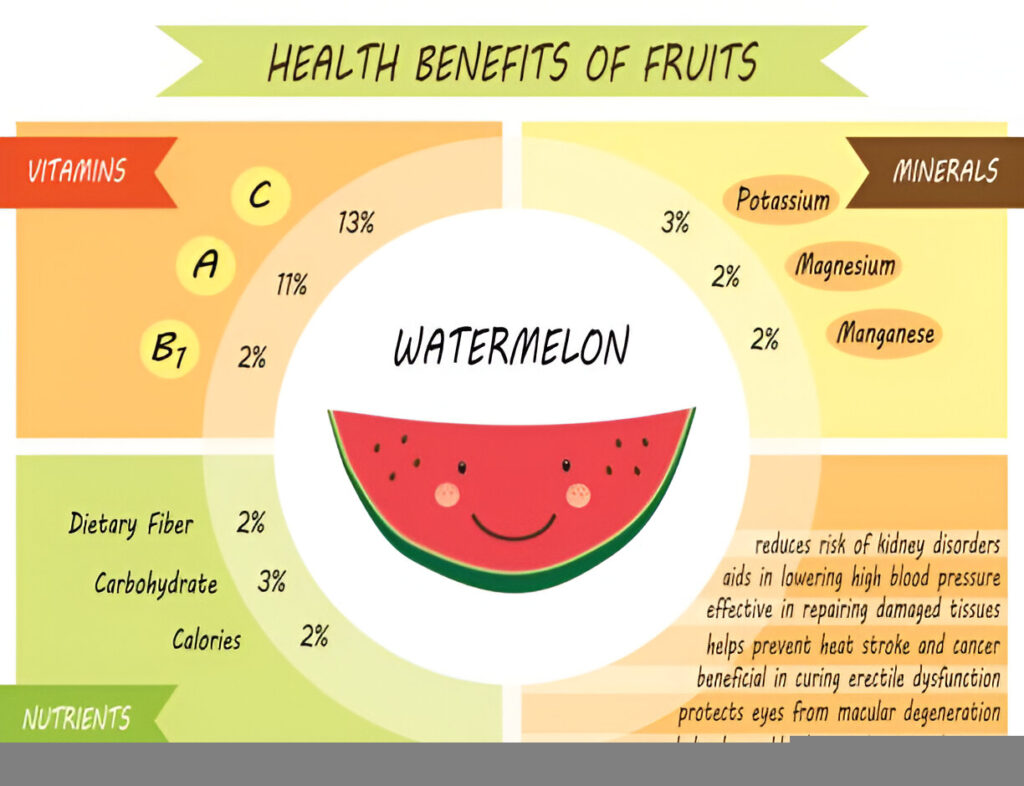Watermelon, with its vibrant red flesh and naturally sweet flavor, is an iconic summer fruit celebrated for its refreshing and hydrating properties. Beyond its delicious taste, watermelon offers a multitude of health benefits that make it an excellent dietary choice during the warmer months. Packed with essential nutrients, antioxidants, and hydration-boosting properties, watermelon serves as a natural ally in combating summer heat, supporting skin health, improving digestion, and replenishing vital electrolytes.
Nutritional Powerhouse

Watermelon is more than just a juicy summer treat; it is a nutrient-dense fruit rich in vitamins, minerals, and antioxidants. It contains:
- Vitamin A – Essential for maintaining healthy skin and vision while also supporting immune function.
- Vitamin C – A potent antioxidant that strengthens the immune system and aids in collagen production, vital for skin elasticity.
- Vitamin B6 – Plays a crucial role in protein metabolism, cognitive development, and immune response.
- Potassium & Magnesium – These minerals help regulate fluid balance, nerve function, and muscle contractions, making them crucial during the summer months when excessive sweating can deplete electrolyte levels.
- Lycopene & Beta-Carotene – Powerful antioxidants that may reduce the risk of certain diseases while offering protection against sun-induced skin damage.
With a water content of approximately 92%, watermelon provides hydration while also delivering these vital nutrients, making it an excellent summer superfood.
Hydration Hero for the Summer
Staying hydrated is essential, particularly in hot weather when the body loses fluids through perspiration. Watermelon plays a crucial role in replenishing lost fluids, reducing the risk of dehydration-related issues such as fatigue, headaches, and muscle cramps. Unlike sugary drinks, watermelon provides natural hydration along with vitamins and minerals, making it a healthier alternative to artificially sweetened beverages.
Natural Electrolyte Replenishment
Watermelon contains electrolytes such as potassium and magnesium, which are essential for maintaining fluid balance, muscle contractions, and nerve signaling. During the summer, increased physical activity and higher temperatures cause the body to lose these minerals through sweat. Consuming watermelon helps restore electrolyte levels naturally, supporting overall well-being and energy levels.
Protection Against Sun-Induced Skin Damage
One of the standout health benefits of watermelon is its high lycopene content. Lycopene is a powerful antioxidant known for its potential to protect the skin from UV-induced damage by neutralizing harmful free radicals. While it does not replace sunscreen, regular consumption of watermelon may enhance the skin’s resilience against sun exposure. Additionally, Vitamins A and C found in watermelon contribute to skin repair and collagen production, promoting a youthful and radiant complexion.
Supports Healthy Digestion
Watermelon aids in digestion due to its high water content and moderate dietary fiber levels. Proper hydration and fiber intake helps maintain regular bowel movements, preventing constipation and digestive discomfort. This is especially beneficial in summer, when dietary habits may shift towards processed and fiber-deficient foods. However, individuals with digestive sensitivities should be mindful of watermelon’s high FODMAP content, which may cause bloating or discomfort in some cases.
Anti-Inflammatory Properties & Muscle Recovery
The antioxidants in watermelon, including lycopene, beta-carotene, and Vitamin C, help reduce inflammation and oxidative stress, which can be exacerbated during summer due to increased sun exposure and outdoor activities. Additionally, watermelon contains citrulline, an amino acid that supports blood flow and muscle recovery, making it a beneficial post-workout snack.
Research Insights on Watermelon’s Summer Benefits
Scientific studies highlight watermelon’s role in maintaining hydration, balancing electrolytes, and providing antioxidant protection during summer. Research suggests that the fruit’s high water content and lycopene concentration may help mitigate oxidative stress and improve overall hydration status. While watermelon should not be viewed as a complete replacement for electrolyte supplements in intense physical activities, its natural composition makes it an excellent addition to a summer diet.
Potential Precautions
While watermelon offers numerous health benefits, it should be consumed in moderation due to its natural sugar content and relatively high glycemic index. Overconsumption may cause digestive discomfort, particularly for individuals with irritable bowel syndrome (IBS) or those sensitive to high-FODMAP foods. Additionally, individuals with kidney disease or those taking medications that affect potassium levels should consult their healthcare provider before consuming large amounts of watermelon.
Conclusion
Watermelon is a summer superfood packed with hydration, essential nutrients, and antioxidants that support overall health. From keeping the body hydrated and replenishing electrolytes to offering protection against sun damage and aiding digestion, watermelon is a refreshing and nutritious choice for the hot months. To fully reap its benefits while avoiding potential drawbacks, it is best consumed in moderation as part of a balanced diet. Whether enjoyed fresh, blended into smoothies, or incorporated into salads, watermelon is the perfect companion for a healthy and refreshing summer.
